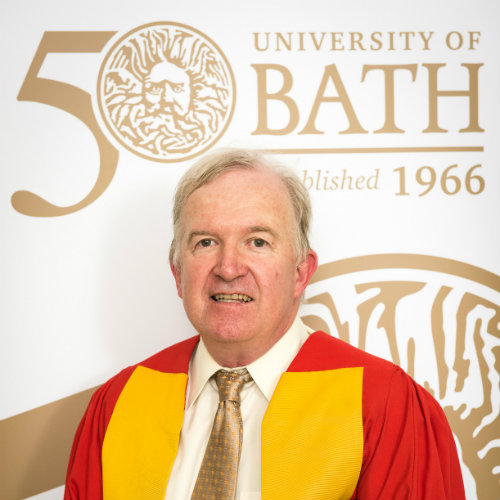Deputy Vice-Chancellor, it is my genuine pleasure to introduce Professor Philip Power FRS of the University of California, Davis who is widely recognised as a world leader in inorganic and organometallic synthetic chemistry. He has made numerous exceptional contributions to science, particularly in the area of low coordinate and low oxidation state main group and transition metal chemistry.
Phil was brought up in Cork, in the Republic of Ireland. His foundation in Chemistry was laid during his Bachelor’s degree at Trinity College, Dublin and latterly at the University of Sussex where he obtained his PhD in 1977 under the supervision of the late Professor Michael Lappert FRS. This postgraduate research, which used bulky ligands to isolate otherwise unstable low oxidation state compounds of tin and lead, initiated a scientific theme which has continued throughout Phil’s career. Phil then travelled to Stanford University for a period of postdoctoral research with Professor Richard Holm between 1978 and 1981, after which he joined the faculty of Chemistry at the University of California, Davis, where he continues to this day as a Distinguished Professor of Chemistry.
Although Phil’s scientific contributions are too numerous to summarise, he is particularly renowned for his introduction of bulky ligand systems, which have allowed the synthesis of a seemingly endless sequence of spectacular, provocative and otherwise ‘non-existent’ compounds. If you don’t appreciate my reference to ‘non-existent compounds’, I would direct you to Dascent’s monograph of the same name (it’s available on the shelves of Level 4 in the Library) that acted as something of a call to arms for inorganic chemistry after its publication in 1966. Phil is one who rose to those challenges, and then some. During his career, he has described a wide array of unique two- and even one-coordinate transition metal species. His 2005 report in Science of the first quintuple chromium-chromium bond elevated the study of metal-metal bonding to unprecedented heights. He has developed stable main group radical species, the first boron–boron double bonds and, in the last decade alone, described unprecedented molecules which include formal double or triple bonds between elements such as aluminium, germanium or tin. While the isolation of these unprecedented main group species alone carries the highest possible fundamental value, Phil’s observations of their reactivity with small molecules like hydrogen and ethylene has also sparked world-wide interest in the development of inexpensive and, dare I say it, sustainable main group element derivatives that can mimic the reactivity of less abundant and precious transition metals. In a similar vein, his current research into the use of weak dispersion interactions for the modulation of organometallic structure and reactivity may yet prove to be his most significant and lasting contribution.
As a measure of his international standing, it almost goes without saying that Phil’s work has been recognised with numerous international honours and awards. These include the Mond Medal of the Royal Society of Chemistry in 2004, the F. Albert Cotton Award in Synthetic Inorganic Chemistry of the American Chemical Society in 2005 and election to Fellowship of the Royal Society in the same year.
Phil has also held a variety of visiting Professorships around the world, most parochially, I’m pleased to say, as the David Parkin Professor at the University of Bath. It was, thus, a real privilege for us to host Phil in the Department of Chemistry for all too short a time in 2013 and for a return visit earlier this year. Phil was the perfect guest; beyond his formal lectures, which were outstanding, he was a constant but unobtrusive presence in 1 South, genuinely interested and happy to offer advice on any aspect of our chemistry. Beyond the science Phil also revealed himself as a knowledgeable and enthusiastic visitor to the Fleet Air Arm Museum in Yeovilton and proved rather partial to a full English (or Irish, depending on your point of view) during his residence in the late lamented Carfax Hotel. Similarly, his predilection for the fish and chips offered by the Pulteney Arms will live long in the memory. Hopefully, we’ll have the chance to repeat that particular experience during his current stay.
His career and dedication to science are a true, if quiet, inspiration. Deputy Vice-Chancellor, I present Professor Philip Power FRS who is eminently worthy to receive the Degree of Doctor of Science, honoris causa.
Professor Michael Hill Orator
